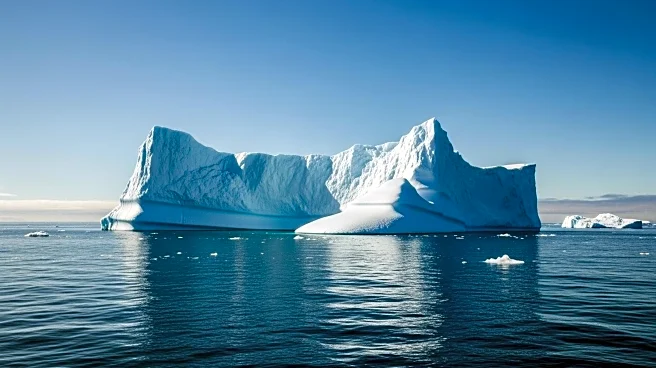What's Happening?
The World Meteorological Organization has reported that glaciers outside the giant ice sheets of Greenland and Antarctica lost 450 billion tonnes of ice in 2024. This loss is equivalent to a block of ice 7 kilometers tall, wide, and deep, enough to fill 180 million Olympic swimming pools. The melting glaciers contribute to rising sea levels, affecting coastal populations worldwide. Mountain communities that rely on glaciers for fresh water are particularly vulnerable. Glaciers act as reservoirs, collecting water as snowfall and releasing it as meltwater during warm periods. The rapid melting observed in recent years is attributed to global warming, with Switzerland's glaciers losing a quarter of their ice in the last decade.
Why It's Important?
The significant loss of glacier ice has profound implications for global sea levels and freshwater availability. Coastal regions face increased risks of flooding and erosion due to rising sea levels. Mountain communities dependent on glaciers for water resources are at risk of losing a critical supply for irrigation, drinking, and hydropower. The situation is particularly dire in Asia's high mountains, where approximately 800 million people rely on glacier meltwater. The ongoing glacier retreat highlights the urgent need for climate action to mitigate further losses and preserve remaining ice. Limiting global warming to 1.5°C above pre-industrial levels could save half of the world's mountain glacier ice.
What's Next?
If global temperatures continue to rise, glaciers will keep retreating, even if temperatures stabilize. The trajectory towards a 2.7°C increase by the century's end could result in losing three-quarters of the ice. Efforts to decarbonize and reduce carbon emissions are crucial to preserving glaciers and mitigating the impacts of climate change. Scientists emphasize the importance of immediate action to prevent further glacier loss and protect vulnerable communities.
Beyond the Headlines
The rapid glacier retreat underscores the broader environmental and societal challenges posed by climate change. The loss of glaciers not only affects water resources but also has cultural and historical implications for regions where glaciers are integral to local identity and heritage. The situation calls for a reevaluation of water management strategies and increased investment in sustainable practices to adapt to changing environmental conditions.









